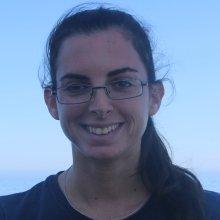
Coral Moreno
Tell us about your work / research. What kinds of things do you do?
Currently, I am studying towards a Ph.D. in Ocean Engineering, and I have just finished my first year, which was full of classes. I am a graduate student of the Center for Coastal and Ocean Mapping (CCOM) at the Marine Autonomous Robotic Vehicle Laboratory (MARVel). My research focuses on micro navigation solutions for autonomous surface vehicles (ASV) to allow autonomous mapping operations of shallow and coastal waters in dynamic and dangerous environments (such as ports, caves, cliffs, icebergs etc.). The idea is autonomous sensor fusion for environmental awareness in real time. That is to combine all of the sensors data to make navigational and maneuvering decisions and respond accordingly. Among the important decision, factors are sea state, dynamic and static obstacle avoidance and completion of the mission. Another potential product of this work can be data fusion to build maps of scenes above and below water.
What sparked your initial interest in your career?
The love of the sea was rooted in me by my parents. As a child, I spent a big part of the time at sea. My dad used to take me on the boat for scuba diving and fishing. I am also a very curious person, seeking to know how things work and why. Therefore, combining physics and engineering for marine applications is something I have been interested in from a very young age.
Who influenced you or encouraged you the most?
My parents and brother have encouraged me to follow passions and dreams since I was a child and supported every decision I have made.
What element of your work / study do you think is the most fascinating?
In my opinion, the most fascinating part is to work on technology that supports the discovery and study of unknown marine territories. Also, seeing something that was broken and you fix it, or something that you developed, in action and that it actually works is very exciting and satisfying.
What other jobs led you to your current career?
In high school, I did a final project in Physical Oceanography about the current regime under the influence of winds and tides at the peak of Gulf of Eilat, Israel.
Two years ago I participated in an ROV internship aboard the E/V Nautilus. Following that, my time was divided between working as a surveyor and ROV operator with EDT Marine Construction/Marteam LTD in Israel and being a guest investigator at the Optical Communication Laboratory at Woods Hole Oceanographic Institute (WHOI). Last fall I started my Ph.D. at CCOM. My job at the marine construction company included: maintaining and piloting an ROV (type Falcon); inspecting marine infrastructures and making scientific dives; mapping the bottom and sub-bottom of the seafloor using a multibeam echo sounder, sidescan sonar, and a sub-bottom profiler; and being an offshore navigator. As a guest investigator in WHOI, I worked on a simulation of underwater light propagation according to different radiative transfer models for the underwater wireless optical communication system of the laboratory.
What are your degrees and certifications?
Bachelor of Science in Physics with specialization in Optics (2009) and Master's of Science in Autonomous Systems and Robotics (2014), both from the Technion - Israel Institute of Technology. Advanced Adventurer SSI certified Scuba Diver; Hypack, QPS Qimera and Fledermaus, and CARIS training.
What are your hobbies?
I enjoy, paddle-boarding, SCUBA diving, sailing, swimming, hiking, biking, yoga, and painting.
What advice would you give to someone who wants to have a career like yours?
There is no clear path to get into the ocean exploration world and working offshore. From what I have seen people from different backgrounds get to work at sea. For example, there are artists that join on scientific cruises and help to spread the word on the importance of this field. If you are interested in the scientific side, then study Geology, Biology, Chemistry, Physics or Archaeology for Bachelor's and do sea related projects. If your heart desires in the engineering aspect and marine technology, then Electrical, Mechanical or Ocean Engineering is the right way to go. Know math, physics, programming and how to build and fix things. Activities are available starting at very young ages, such as SeaPerch. Look for opportunities to get hands-on experience, such as internships, university organizations that build ROVs or ASVs etc. Be curious, say yes to every opportunity that occurs in your way, learn from everyone around you and be persistent. Last but not least, HAVE FUN!
How did you get involved with the Nautilus Exploration Program? How did you get on the ship?
I am a graduate student at CCOM, which collaborates with Ocean Exploration Trust (OET). When I heard that there are mapping positions for people from CCOM, I asked to join. This is my second time on EV Nautilus. The first time was two years ago and I was an ROV intern.
Expeditions
Coral participated in the following Ocean Exploration Trust expeditions:
